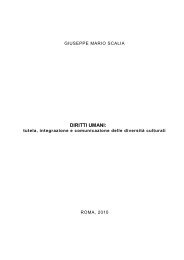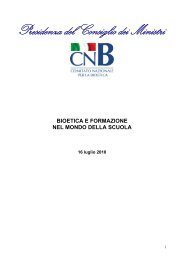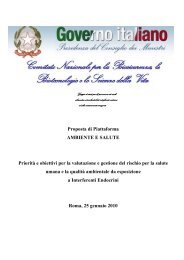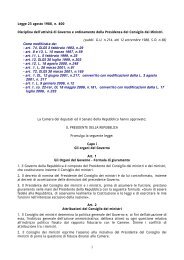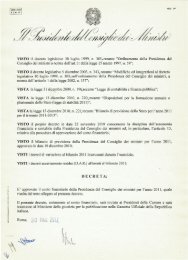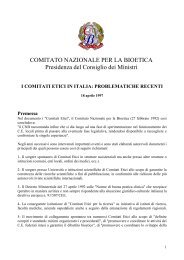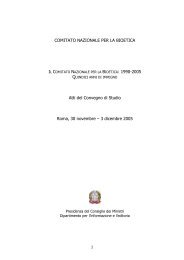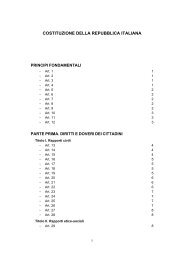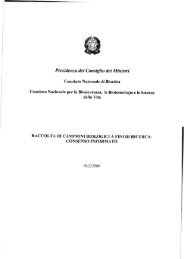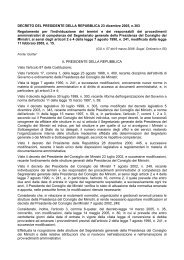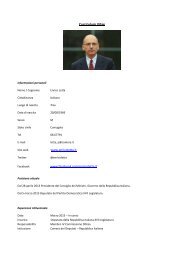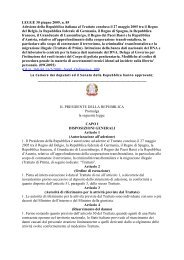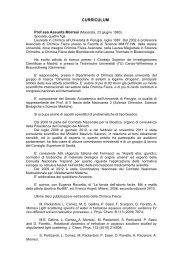President
President
President
Create successful ePaper yourself
Turn your PDF publications into a flip-book with our unique Google optimized e-Paper software.
distributive unfairness and identify, taking into account the empirical<br />
investigations on the social stratification of such an essential good, the legal<br />
perspective in order to suggest effective corrective solutions.<br />
As highlighted in the previous NBC document on this issue (NBC,<br />
2001) 273 , which it’s appropriate to mention in order to reconstruct the theoretical<br />
and conceptual framework of our work, the concept of possible health, as well<br />
as being in line with the point of view that values health as the condition to<br />
express a variety of capabilities (Nussbaum and Sen, 1993), also presents<br />
other advantages. It has the benefit, on the one hand, of linking medical care<br />
with an idea of health and prevention that is not reductive, and on the other<br />
hand, of introducing what is one of the major problems of healthcare justice: the<br />
impossibility of deciding distributive issues, giving everyone the same amount<br />
of resources because of the different “natural and social” distribution of<br />
illnesses and of psychophysical deficiencies.<br />
It follows, therefore, that we cannot respond to issues concerning health<br />
by simply emphasizing distributive equality, but we must rather look for a<br />
morally justified criterion for selecting priorities, so that everyone can be offered<br />
equal opportunities in reaching the maximum potential of health allowed to<br />
those in the same age group. In other words, it is important to support, when<br />
distributing limited resources, the most disadvantaged groups and individuals<br />
(Rawls, 1971); and this also means a greater commitment in researching<br />
measures capable of contrasting the “Inverse Care Law” – the phenomenon for<br />
which the availability of good healthcare services varies inversely with the need<br />
of the population served – which still seems to characterise healthcare in many<br />
areas.<br />
Moving on a different level, still concerning the issue “equality/difference”<br />
in distributive justice, it can be helpful to recall some ideas presented in the<br />
“classic” essay by the English philosopher Bernard Williams on the idea of<br />
equality (Williams, 1973). What William proposes is one of the possible ways to<br />
give value, not simply rhetorical value, to the notion of “respect for human<br />
dignity”. This author invites us, in fact, to reflect on what can still advocate the<br />
statement, apparently tautological, of the equality of men as men: an<br />
incomplete but not banal statement, as it serves to remind us of the<br />
“significance” of our common humanity. The concept of equality is relational<br />
(“equality between who?”) and abstract, in the sense that it presumes a mental<br />
process conceptualising the concrete characteristics of the individuals under<br />
consideration (“in what, or compared to what, are the individuals in question<br />
equal and/or must be considered equal?”); it follows that the judgement of<br />
equality always applies not to two or more individuals being the same, but to<br />
their equivalence, or similarity, from a point of view that we consider relevant<br />
and the relevance of which we are prepared to justify with good reasons<br />
(Revelli, 1995).<br />
A pertinent response to tackle the issues linked to the topic under<br />
consideration, is that which deems relevant, from an ethical point of view, two<br />
aspects of our “common humanity”, from which derive moral expectations we<br />
can recognise as worthy of respect:<br />
the first one unites us for our most common aspects of fragility,<br />
vulnerability, mutual dependence: having primary needs that must be met, the<br />
ability to feel pain, suffer because of immediate physical causes, as well as<br />
273 NBC, Bioethical Guidelines for Equal Access to Healthcare, 25 th of May 2001,<br />
http://www.governo.it/bioetica/eng/opinions.html.<br />
216



